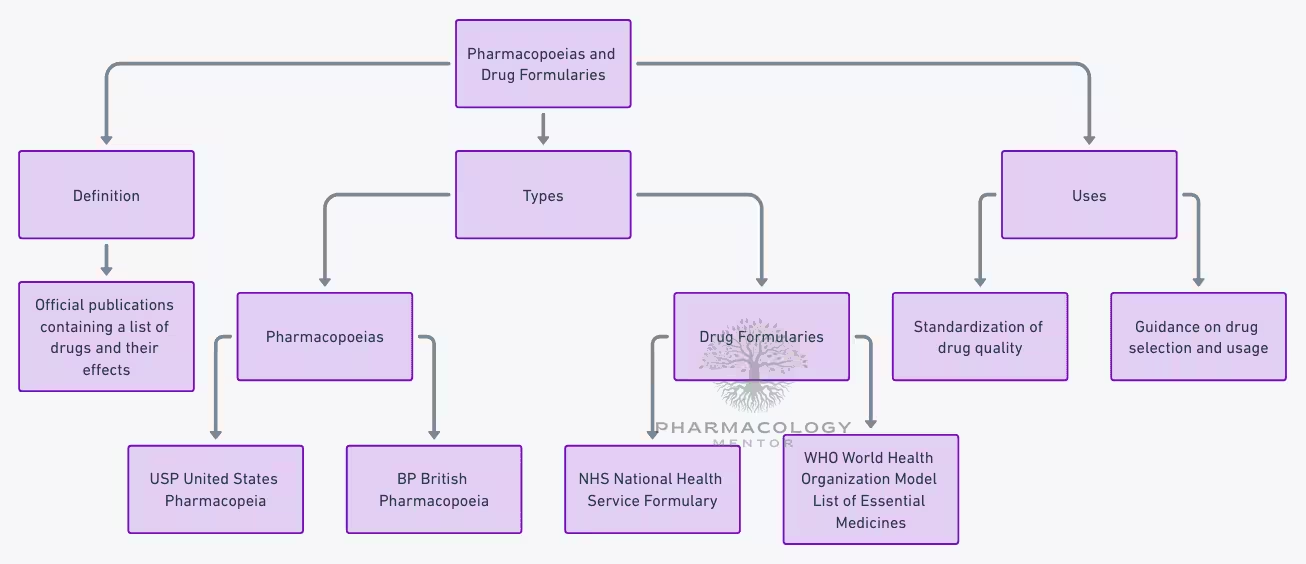Pharmacopoeias and formularies are two types of drug compendia commonly used in the healthcare sector. Government-published official compendia that have legal status are Pharmacopoeias. They contain information on officially approved drugs in a country, including their chemical structure, molecular weight, physical and chemical characteristics, solubility, identification and assay methods, purity standards, storage conditions, and dosage forms. Examples of pharmacopoeias include Indian Pharmacopoeia (IP), British Pharmacopoeia (BP), European Pharmacopoeia (Eur P), and United States Pharmacopoeia (USP).
On the other hand, formularies are unofficial compendia that professional bodies publish. They list indications, doses, dosage forms, contraindications, precautions, adverse effects, and storage of selected drugs available for medicinal use in a country. Therapeutic class is a classification system for drugs; some logical fixed-dose drug combinations are among them. Formularies also provide a brief commentary on the drug class and clinical conditions in which they are used and guidelines for treating selected conditions. Examples of formularies include the British National Formulary (BNF) and the National Formulary of India (NFI).
For more information on drug compendia, please refer to this page.
Martindale: The Complete Drug Reference
Martindale: The Complete Drug Reference is a non-official compendium published every 2-3 years by the Royal Pharmaceutical Society of Great Britain. It is an exhaustive and updated compilation of unbiased information on medicines used or registered all over the world. It includes new launches and contains pharmaceutical, pharmacological, and therapeutic information on drugs, which can serve as a reliable reference book. Students, researchers, and healthcare professionals all frequently use this compendium.
Physicians Desk Reference (PDR) and Drug: Facts and Comparisons
Other useful non-official compendia include the Physicians Desk Reference (PDR) and Drug: Facts and Comparisons, both published in the United States. These compendia provide detailed information on drugs, including their indications, dosage forms, contraindications, precautions, adverse effects, and interactions with other drugs. Doctors, pharmacists, and other healthcare professionals use them in the US.
FAQs
What are Pharmacopoeias and Drug Formularies?
Pharmacopoeias and drug formularies are official publications that contain a list of drugs and their effects. They are authoritative and recognized globally, providing standards for drug quality, purity, strength, and consistency.
Types of Pharmacopoeias and Drug Formularies
There are several types of pharmacopoeias and drug formularies. Pharmacopoeias, such as the United States Pharmacopoeia (USP) and the British Pharmacopoeia (BP), provide standards for the manufacture of drugs, ensuring their quality, safety, and efficacy.
On the other hand, drug formularies, like the National Health Service (NHS) Formulary and the World Health Organization (WHO) Model List of Essential Medicines, provide a list of drugs that are approved for use within a particular healthcare system. These formularies guide healthcare professionals in selecting the most appropriate, effective, and cost-effective treatments for their patients.
Uses of Pharmacopoeias and Drug Formularies
Pharmacopoeias and drug formularies serve several crucial functions in healthcare. They are used to standardize drug quality, ensuring that all drugs meet the necessary safety and efficacy standards. They also guide drug selection and usage, helping healthcare professionals choose the most appropriate treatments for their patients.
In conclusion, pharmacopoeias and drug formularies are essential tools in the healthcare industry. They ensure the quality and safety of drugs, guide healthcare professionals in their practice, and ultimately contribute to better patient outcomes.
Disclaimer: This article is for informational purposes only and should not be taken as medical advice. Always consult with a healthcare professional before making any decisions related to medication or treatment.
Medical Disclaimer
The medical information on this post is for general educational purposes only and is provided by Pharmacology Mentor. While we strive to keep content current and accurate, Pharmacology Mentor makes no representations or warranties, express or implied, regarding the completeness, accuracy, reliability, suitability, or availability of the post, the website, or any information, products, services, or related graphics for any purpose. This content is not a substitute for professional medical advice, diagnosis, or treatment; always seek the advice of your physician or other qualified health provider with any questions you may have regarding a medical condition and never disregard or delay seeking professional advice because of something you have read here. Reliance on any information provided is solely at your own risk.

